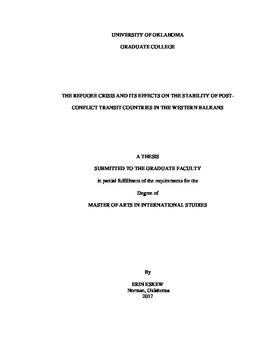| dc.contributor.advisor | HEINZE, ERIC | |
| dc.contributor.author | ESKEW, ERIN | |
| dc.date.accessioned | 2017-12-15T19:20:15Z | |
| dc.date.available | 2017-12-15T19:20:15Z | |
| dc.date.issued | 2017-12-15 | |
| dc.identifier.uri | https://hdl.handle.net/11244/52938 | |
| dc.description.abstract | The 2011 Arab Spring has created a serious migration and humanitarian crisis.
Asylum seekers began attempting to reach Europe through various routes due to
brutal conflict in their home countries. This influx has affected countries on the
periphery of the European Union, including the Western Balkans. The Western
Balkans route is the second-most traversed route from the Middle East and North
Africa to the EU. The surge of migration into these so-called transit countries have
left them grappling with questions of how to manage, process, and integrate refugee
populations. This thesis looks at three case countries – Croatia, Serbia, and
Macedonia – and seeks to explain why and what effects this influx of asylum seekers
and, often, the unanticipated long-term stay of asylum seekers has on the political,
economic, and social stability of the case countries. | en_US |
| dc.language | en_US | en_US |
| dc.subject | BALKANS | en_US |
| dc.subject | STABILITY | en_US |
| dc.subject | REFUGEES | en_US |
| dc.subject | MIGRATION | en_US |
| dc.title | THE REFUGEE CRISIS AND ITS EFFECTS ON THE STABILITY OF POST-CONFLICT TRANSIT COUNTRIES IN THE WESTERN BALKANS | en_US |
| dc.contributor.committeeMember | CRUISE, REBECCA | |
| dc.contributor.committeeMember | RAYMOND, MARK | |
| dc.date.manuscript | 2017-12-15 | |
| dc.thesis.degree | Master of Arts in International Studies | en_US |
| ou.group | College of International Studies | en_US |
| shareok.nativefileaccess | restricted | en_US |
